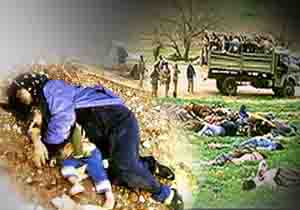Iraq’s supreme criminal court assigned to review crimes done by the former Iraqi Baath regime during the 1991 uprising (Shabaniyah Intifada) announced that it has received 5,000 complaints filed against the regime and anti Iran terrorist group, the Mojahedin-e Khalq Organization (MKO).

The court confirmed in its first session that it has received 5,000 authentic and verifiable complaints from the people of the northern Iraqi region of Kurdistan.
The families of the victims as well as those disabled during the suppression of the uprising have asked for chasing and punishing those responsible for the crimes done during the suppression of intifada in northern and southern Iraq, the Iranian website Habilian reported.
The court also issued law suits for 112 members of the former Baath regime, the most prominent of them Ali Hassan Al-Majid, known as the Chemical Ali.
The Shabaniyah Intifada aimed to free Iraq from rule of the Baathist regime and to stand against the US raids and possible occupation of the country in 1991. The Intifada succeeded in setting free nine southern Iraqi provinces, but after Iraq’s withdrawal from Kuwait, the Shiite population came under a savage attack by the Iraqi army which claimed the lives of tens of thousands of them.
At the time, the MKO played such an outstanding role in suppressing the uprising that former Iraqi dictator Saddam Hussein described the MKO leader, Masoud Rajavi, as his savior and allocated a $30-million monthly budget to the terrorist organization until he was deposed in 2003.
The group fled to Iraq in 1986, where it was protected by Saddam Hussein and where it helped the Iraqi dictator suppress Shiite and Kurd uprisings in the country.
The terrorist group joined Saddam’s army during the Iraqi imposed war on Iran (1980-1988) and helped Saddam and killed thousands of Iranian civilians and soldiers during the US-backed Iraqi imposed war on Iran.
The MKO has been in Iraq’s Diyala province since the 1980s.

